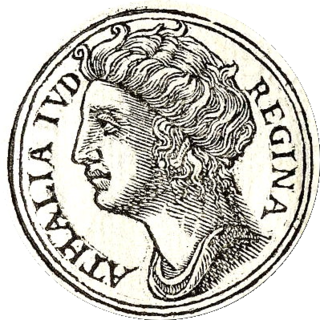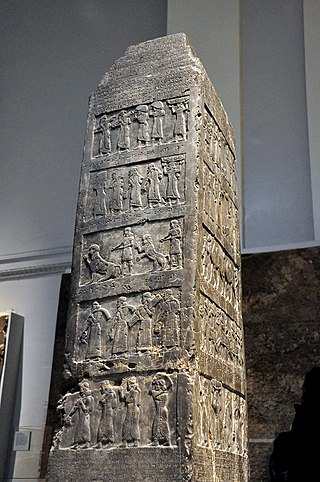
Ahab was the son and successor of King Omri and the husband of Jezebel of Sidon according to the Hebrew Bible. He was widely criticized for causing "moral decline" in Israel, according to the Yahwists. Modern scholars argue that Ahab was a Yahwist and introduced Yahweh to the Kingdom of Judah via imperialism. This mostly occurred in the latter half of his reign.
The Book of Kings is a book in the Hebrew Bible, found as two books in the Old Testament of the Christian Bible. It concludes the Deuteronomistic history, a history of ancient Israel also including the books of Joshua, Judges, and Samuel.

Jehu was the tenth king of the northern Kingdom of Israel since Jeroboam I, noted for exterminating the house of Ahab. He was the son of Jehoshaphat, grandson of Nimshi, and possibly great-grandson of Omri, although the latter notion is not supported by the biblical text. His reign lasted 28 years.

The Kingdom of Israel, also called the Northern Kingdom or the Kingdom of Samaria, was an Israelite kingdom that existed in the Southern Levant during the Iron Age. Its beginnings date back to the first half of the 10th century BCE. It controlled the areas of Samaria, Galilee and parts of Transjordan; the former two regions underwent a period in which a large number of new settlements were established shortly after the kingdom came into existence. It had four capital cities in succession: Shiloh, Shechem, Tirzah, and the city of Samaria. In the 9th century BCE, it was ruled by the Omride dynasty, whose political centre was the city of Samaria.

Omri was, according to the Hebrew Bible, the sixth king of Israel. He was a successful military campaigner who extended the northern kingdom of Israel. Other monarchs from the House of Omri are Ahab, Ahaziah, Joram, and Athaliah. Like his predecessor, king Zimri, who ruled for only seven days, Omri is the second king mentioned in the Bible without a statement of his tribal origin. One possibility, though unproven, is that he was of the tribe of Issachar.

Shalmaneser III was king of the Neo-Assyrian Empire from the death of his father Ashurnasirpal II in 859 BC to his own death in 824 BC.

Athaliah was the daughter of either king Omri, or of King Ahab and Queen Jezebel of Israel; she was queen consort of Judah as the wife of King Jehoram, a descendant of King David, and was later queen regnant c. 841–835 BCE.

Jehoram was the ninth king of the northern Kingdom of Israel. He was the son of Ahab and Jezebel, and brother to Ahaziah and Athaliah.

Ahaziah of Judah or Jehoahaz I, was the sixth king of Judah, and the son of Jehoram and Athaliah, the daughter of king Ahab of Israel. He was also the first Judahite king to be descended from both the House of David and the House of Omri, through his mother and successor, Athaliah.

The Black Obelisk of Shalmaneser III is a black limestone Neo-Assyrian sculpture with many scenes in bas-relief and inscriptions. It comes from Nimrud, in northern Iraq, and commemorates the deeds of King Shalmaneser III. It is on display at the British Museum in London, and several other museums have cast replicas.

The Omride dynasty, Omrides or House of Omri were the ruling dynasty of the Kingdom of Samaria founded by King Omri. The dynasty's rule ended with the murder of Zechariah of Israel by Shallum in 752 BCE, who was then killed by Menahem in the next month.
Nimshi is a character in the Hebrew Bible. He is mentioned in the Books of Kings and the Second Book of Chronicles as father, grandfather, or possibly a forebear of Jehu, the king of the Northern Kingdom of Israel.

2 Kings 1 is the first chapter of the second part of the Books of Kings in the Hebrew Bible or the Second Book of Kings in the Old Testament of the Christian Bible. The book is a compilation of various annals recording the acts of the kings of Israel and Judah by a Deuteronomic compiler in the seventh century BCE, with a supplement added in the sixth century BCE. This chapter focuses on Ahaziah of Israel, the son of Ahab, and the acts of Elijah the prophet who rebuked the king and prophesied the king's death.

2 Kings 8 is the eighth chapter of the second part of the Books of Kings in the Hebrew Bible or the Second Book of Kings in the Old Testament of the Christian Bible. The book is a compilation of various annals recording the acts of the kings of Israel and Judah by a Deuteronomic compiler in the seventh century BCE, with a supplement added in the sixth century BCE. This chapter records Elisha's acts in helping the family of Shunammite woman to escape famine, then to gain back their land and in contributing to Hazael's ascension to the throne of Syria (Aram) in verses 7–15; then subsequently records the reigns of Joram and Ahaziah, the kings of Judah.

2 Kings 9 is the ninth chapter of the second part of the Books of Kings in the Hebrew Bible or the Second Book of Kings in the Old Testament of the Christian Bible. The book is a compilation of various annals recording the acts of the kings of Israel and Judah by a Deuteronomic compiler in the seventh century BCE, with a supplement added in the sixth century BCE. This chapter records Jehu's anointing as the next king of Israel and his assassinations of Jehoram of Israel, Ahaziah of Judah and Jezebel, the queen mother of Israel. The narrative is a part of a major section 2 Kings 9:1–15:12 covering the period of Jehu's dynasty.

2 Kings 10 is the tenth chapter of the second part of the Books of Kings in the Hebrew Bible or the Second Book of Kings in the Old Testament of the Christian Bible. The book is a compilation of various annals recording the acts of the kings of Israel and Judah by a Deuteronomic compiler in the seventh century BCE, with a supplement added in the sixth century BCE. This chapter records Jehu's massacres of the sons of Ahab, the kinsmen of Ahaziah the king of Judah and the Baal worshippers linked to Jezebel. The narrative is a part of a major section 2 Kings 9:1–15:12 covering the period of Jehu's dynasty.

2 Kings 12 is the twelfth chapter of the second part of the Books of Kings in the Hebrew Bible or the Second Book of Kings in the Old Testament of the Christian Bible. The book is a compilation of various annals recording the acts of the kings of Israel and Judah by a Deuteronomic compiler in the seventh century BCE, with a supplement added in the sixth century BCE. This chapter records the reign of Joash as the king of Judah.

2 Chronicles 22 is the twenty-second chapter of the Second Book of Chronicles the Old Testament in the Christian Bible or of the second part of the Books of Chronicles in the Hebrew Bible. The book is compiled from older sources by an unknown person or group, designated by modern scholars as "the Chronicler", and had the final shape established in late fifth or fourth century BCE. This chapter belongs to the section focusing on the kingdom of Judah until its destruction by the Babylonians under Nebuchadnezzar and the beginning of restoration under Cyrus the Great of Persia. The focus of this chapter is the reigns of Ahaziah and Athaliah, rulers of Judah.

1 Kings 16 is the sixteenth chapter of the Books of Kings in the Hebrew Bible or the First Book of Kings in the Old Testament of the Christian Bible. The book is a compilation of various annals recording the acts of the kings of Israel and Judah by a Deuteronomic compiler in the seventh century BCE, with a supplement added in the sixth century BCE. 1 Kings 12:1-16:14 documents the consolidation of the kingdoms of northern Israel and Judah. This chapter focusses on the reigns of Baasha, Elah, Zimri, Omri and Ahab in the northern kingdom during the reign of Asa in the southern kingdom.















